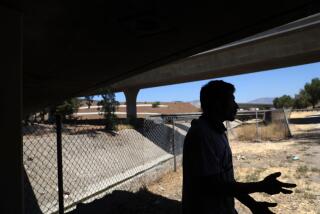The shelter storm
Brace yourself, Los Angeles. A storm has been building for four years over a controversial city ordinance on day laborers that has infuriated conservatives nationwide, and it’s about to break -- perhaps as early as this week.
The ordinance, which was approved last week by the City Council’s Planning and Land Use Management Committee and will soon appear before the full council, requires home-improvement chains seeking to build new big-box stores or renovate existing ones to submit “day laborer operating standards” to the city. These standards don’t require the stores to build shelters for the workers, but if day laborers become a nuisance, that is the main remedy outlined in the ordinance. It also directs that the shelters be covered and include amenities such as drinking water, restrooms, places to sit and trash cans.
As anyone who has ever shopped at a warehouse-sized hardware store like Home Depot knows, they tend to be magnets for day laborers, most of whom are probably undocumented immigrants. Proponents of the ordinance argue that these workers constitute a public nuisance, one that the stores themselves are obliged to eliminate by providing shelters where the workers can gather without blocking traffic, littering the streets or urinating on sidewalks. But anti-illegal-immigrant activists see ordinances like Los Angeles’ as something else: an attempt by municipal governments to coddle lawbreakers and even encourage illegal immigration.
When the city of Burbank ordered Home Depot to build a shelter as a condition of opening a new store in 2006, it touched off protest as far away as Washington. As Congress weighed a comprehensive immigration reform bill, amendments forbidding cities from demanding such shelters were attached to both the House and Senate versions. The immigration bills failed, and so did the amendments. That set the stage for the return of L.A.’s ordinance, which was first proposed by Councilman Bernard C. Parks in 2004 but has been in limbo as city officials negotiated with representatives of Home Depot. Though the ordinance would apply to other big-box chains, such as Lowe’s and Orchard Supply Hardware, those stores seldom attract sizable populations of day laborers and could avoid building shelters if the city deems that they don’t present a problem.
The case against Los Angeles’ ordinance can be broken down into two parts: First, there’s the anti-illegal-immigrant argument that government shouldn’t be demanding amenities that make life easier for people who break the law, and second, there’s the pro-business rationale that the city shouldn’t impose added costs and liabilities on private enterprises in order to solve a social problem that’s not of their making. The first argument is pretty easy to dismiss. The second isn’t.
Anti-illegal-immigrant activists presuppose that the shelters would be built solely for the benefit of the day laborers who would use them. Actually, Parks proposed the ordinance in an attempt to protect the surrounding community. Crowds of hot, thirsty men without access to bathrooms certainly may constitute a nuisance for nearby businesses and residents. If the shelters do represent a benefit for the workers, it’s that they could reduce the risk of injury from gathering on sidewalks or in parking lots, and even the most hostile immigrant-bashers would have a tough time arguing that we should let people be run over because they’re in the United States illegally.
Moreover, it’s absurd to think that teeming hordes in Mexico and Central America are rushing for the northern border because they’ve heard that Los Angeles is building comfy spots to lounge in while they’re begging for jobs. The shelters would serve people who have come here anyway, and who would gather at home-improvement stores even if the shelters didn’t exist, just as they currently do.
Yet for all that, there are solid reasons to oppose Parks’ ordinance. The councilman believes that the stores themselves are responsible for the day laborers who gather there, and thus that they should be stuck with the bill for the shelters. Yet there’s little evidence that the stores have done anything to encourage day laborers to congregate. The chains are hardly to blame for the socioeconomic gap that lures immigrants to the United States, nor the behavior of the customers who hire them, nor Washington’s failure to protect our borders.
The shelters would not be cheap. The Burbank Home Depot that sparked such ire on Capitol Hill was forced to spend $94,000 to build its facility, in addition to ongoing costs to maintain it. The structure might also raise liability issues, making the store legally responsible for anything that happens to those who use it.
It’s commonplace for cities to order developers to mitigate environmental nuisances, such as noise and traffic, created by their projects. Can groups of day laborers really be considered that kind of nuisance, when their arrival is unsolicited, unpredictable and out of the control of the developer? That would be like forcing businesses throughout downtown Los Angeles to build homeless shelters because the homeless happen to congregate there. It isn’t that the shelters aren’t needed, it’s that the burden of putting them up rightly belongs to government, not business.
The city does team up with nonprofit groups to build and operate day laborer shelters, some of which have been constructed with help from Home Depot. If the council is concerned about public nuisances, it should build more. That, of course, would attract even more fury from the anti-illegal-immigration crowd, which would argue that taxpayers were directly subsidizing services for people here illegally. But until Washington passes sensible immigration reform legislation that makes it easier for these laborers to get legitimate jobs as guest workers, taxpayers will continue to be burdened with the extra costs of the underground economy.
More to Read
Sign up for Essential California
The most important California stories and recommendations in your inbox every morning.
You may occasionally receive promotional content from the Los Angeles Times.









